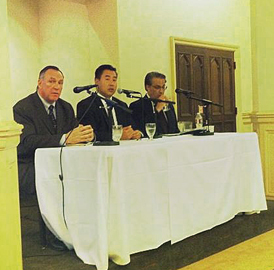The three contenders: San Francisco Supervisor Ross Mirkarimi, sheriff’s Capt. Paul Miyamoto, and Chris Cunnie, formerly an undersheriff, San Francisco police officer and president of the Police Officers Association.
Saul Sugarman was there reporting for KQED. There were no opportunities for the audience to ask questions, he says, but many applauded statements by their favorite candidates — namely Mirkarimi and Miyamoto. Only a handful of apparent Cunnie supporters made a showing.
“I would say Mirkarimi is definitely the most articulate, but Miyamoto has the internal experience that I think is really beneficial in a law enforcement setting,” said Constance Farrell, a master’s student at USF.
Among the issues debated: whether deputies should be on patrol, if the sheriff’s department should merge with SFPD, whether civilian oversight of the sheriff’s department should exist, and how to tackle substance abuse.
On the issue of civilian oversight, Chris Cunnie was opposed. Miyamoto thought the department had already incorporated civilians into its operations, and that elections by themselves served as an adequate populist monitor.
“I believe the people have the ultimate oversight here because the sheriff is an elected position,” he said. “Every four years, the people themselves determine whether or not the sheriff is doing the job in terms of managing and in terms of oversight in these areas.”
In support of civilian oversight, Mirkarimi said, “excessive use of force or abuse of authority is sometimes a routine hazard or industry hazard outside the jail system and certainly inside the jail system.”
A debate among the candidates last week focused on realignment — the recent transfer of thousands of prisoners by the state to county jails, including the six in San Francisco. From KGO’s report:
“We have the tools in place to be adequately prepared to deal with this [realignment] challenge,” said Miyamoto.
Miyamoto is optimistic; Mirkarimi not so much.
“The state has failed in its ability to rehabilitate prisoners. So they are now deflecting that responsibility back to local government,” said Mirkarimi.
Cunnie wants to deflect it right back to the state by asking for money.
“We have to be in Sacramento, we have to make sure the governor does something long term on the ballot to fund realignment,” said Cunnie.
And on the subject of legalizing marijuana:
“I don’t believe that we want to send a message to young people that smoking marijuana is a good thing,” [said Cunnie]. And if you legalize it that’s the message.”
Miyamoto says now’s not the time.
“It would take a massive undertaking and a lot of money and resources to do that effectively,” said Miyamoto.
Mirkarimi says legalize it and save money.
“Governments have absolutely wasted billions of dollars in the war on drugs,” said Mirkarimi.
You can also hear the candidates talk about realignment, as well as their views on rehabilitation, in this video from an October debate, moderated by KQED’s Belva Davis.
Regarding Secure Communities, the U.S. Immigration and Customs Enforcement’s program that requires local law enforcement agencies to send fingerprints of everyone who has been arrested to a central federal database for a check on their immigration status, Mirkarimi and Miyamoto addressed the issue in this Huffington Post piece on July 13 (before Cunnie entered the race). Hennessey has made headlines by attempting to opt out of the program.
From the Huffington Post:
Miyamoto paints a picture of a department that could be run on a basis of consensus. Even as contentious an issue as the Secure Communities immigration program, Miyamoto said, could be divorced to some extent from politics. Hennessey has decided to release possibly undocumented prisoners before Immigration and Customs Enforcement can identify their fingerprints, much to the offense of conservatives.
Miyamoto said while that decision had “obvious political components,” it was also “a decision balancing different laws and the priorities of the community. In that respect it is political, but I don’t think it is overtly political.”
“I think he made a very tough decision on a complex issue. And I think that he showed some courage in making that decision. I wouldn’t be able to tell you if it was right or wrong. In my eyes, I think it’s a good balance between the two,” Miyamoto said.
Supervisor Mirkarimi argued that taking a stance that openly defied ICE was critical. Hennessey’s “early vocal response was enough to arouse the concerns of other jurisdictions, including governors of large states, to reassess the unintended consequences of ICE’s actions.”
Chris Cunnie’s campaign sent us this statement on Secure Communities:
Chris Cunnie served as Undersheriff under Michael Hennessey at the time this policy was first considered and he supports the Sheriff’s decision. As a former San Francisco police officer and former Chief of Investigations in the District Attorney’s office Chris Cunnie knows first hand that partnership with the community is a requirement for a safe city. It is extremely difficult to maintain these partnerships when those charged with minor offenses, their families, and even witnesses fear deportation.
Sheriff Hennessey has endorsed Mirkarimi, and Cunnie has been endorsed by the Chronicle.
